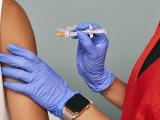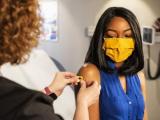Editor's note: This story was revised Mar 17 to include additional information about the number of claims filed and processing steps.
Mar 16, 2011 (CIDRAP News) – The US Department of Health and Human Services (HHS) has so far received 386 claims of injuries related to the 2009 pandemic H1N1 vaccine and related pandemic countermeasures, HHS officials reported today.
The claims describe a wide range of complaints, from breathing difficulties and numbness to seizures and even death, according to Dr. Vito Caserta, director of the Countermeasures Injury Compensation Program (CICP).
"To date, 54 claims have been filed that appear to have been submitted with sufficient medical records to place them in line for review. Of these, 26 have begun a medical review," Caserta told CIDRAP News in response to a query.
Studies have generally shown that the monovalent 2009 H1N1 vaccine was just as safe as seasonal flu vaccines, but people who believe they were harmed by the vaccine, or by other pandemic countermeasures such as antiviral drugs, can file claims with the CICP.
The program, administered by the Health Resources and Services Administration (HRSA), was set up under the Public Readiness and Emergency Preparedness Act of 2005. It is designed to give claimants an avenue for pursuing damages without going to court, while shielding drug companies and medical providers from most lawsuits claiming harm from medical countermeasures for pandemic flu and other public health emergencies, such as bioterrorist attacks.
In purpose, the CICP is similar to the Vaccine Injury Compensation Program (VICP), established in 1988, which handles damage claims related to seasonal flu vaccines and other vaccines. Both programs have the aim of ensuring adequate supplies of vaccines and other countermeasures by protecting manufacturers from a flood of lawsuits that could drive them out of the market.
Caserta said 373 of the claims submitted so far pertain to the H1N1 vaccine, one pertains to the vaccine plus antiviral drugs, and one relates to the vaccine and a mechanical ventilator. The rest of the claims relate to the vaccine but were filed after the deadline, he reported.
He provided a long list of conditions cited in the H1N1-related claims that HRSA has received so far: "Guillain Barre Syndrome (GBS), breathing difficulties, numbness/tingling, soreness/pain at injection site, fever, headaches/migraines, weakness/fatigue, acute allergic reaction, rash, tachycardia, miscarriage, dizziness/nausea, muscle cramps/spasms, paralysis, cough, flu symptoms, neuropathy, vision problems, swelling, vomiting/diarrhea, transverse myelitis, pneumonia, seizures, neurologic conditions, loss of hearing/balance, joint infection, death, myalgias, ADEM [acute disseminated encephalomyelitis], encephalopathy, serum reaction, and some other conditions at a lower frequency."
In addition to the pandemic vaccine, the CICP covers the anthrax and smallpox vaccines, which many US military personnel receive, and countermeasures for botulism and radiation exposure. Caserta said the program has received eight claims related to those vaccines.
The CICP first published its administrative procedures and regulations last October, permitting people to begin filing formal claims. Before that, HRSA accepted letters from people explaining their intent to file a formal claim later, after publication of the administrative procedures. To be considered, reports of alleged injuries must be submitted within 1 year from when the person was vaccinated or treated.
Caserta said each claim is reviewed by a physician working under the supervision of another physician who is experienced in handling such evaluations. Other experts can also be called in if needed.
If a claim is denied, the claimant can ask for a "Reconsideration Panel" review, Caserta said. After reviewing the case, that panel makes a recommendation to the associate administrator of HRSA's Healthcare Systems Bureau, who is charged with making the final decision.
Caserta said it is too early to estimate how long it will take to process claims. "These first cases that are currently being processed will require a longer time because we are fine-tuning and finalizing internal processes and procedures," he said. "We have not yet finalized any of these initial reviews but we are close. Once the first few are finalized in the coming weeks subsequent cases should move through much more quickly."
The CICP covers only the monovalent version of the 2009 H1N1 vaccine. The 2009 H1N1 virus was included in the 2010-11 seasonal flu vaccine, which is covered by the VICP.
The two programs process claims somewhat differently, according to HHS. In the VICP, physicians review claims and write reports, but special masters or judges of the US Court of Claims make the decisions on entitlement and benefits.
An HRSA information chart concerning the VICP program shows that 537 injury claims related to influenza vaccines had been filed as of Oct 12, 2010. Of those, 189 led to compensation and 49 were dismissed.
See also:
CICP page on HRSA site
Oct 2010 HHS release on administrative regs for the CICP
Sept 15, 2010, CIDRAP News story "Pending injury claims over 2009 H1N1 vaccine increase"
Sep 17, 2010, CIDRAP News story "VAERS study finds H1N1 vaccine safety similar to seasonal vaccines'"




















